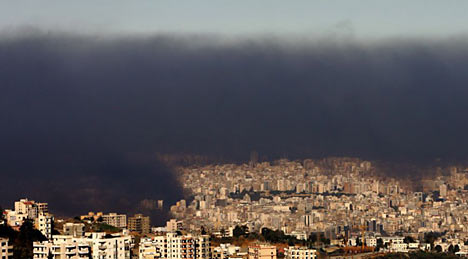 Jan 24, Life was returning to normal in the Lebanese capital and around the country Wednesday, a day after violent confrontation between government supporters and opponents killed three people and wounded dozens. The violence was the worst escalation of the opposition’s campaign to topple Prime Minister Fuad Saniora’s Cabinet.
Jan 24, Life was returning to normal in the Lebanese capital and around the country Wednesday, a day after violent confrontation between government supporters and opponents killed three people and wounded dozens. The violence was the worst escalation of the opposition’s campaign to topple Prime Minister Fuad Saniora’s Cabinet.
Most private and public schools that closed Tuesday after the opposition called a general strike against the government reopened Wednesday as did banks and commercial shops in Beirut and other cities. The road to the airport, closed by burning tires and earthen barricades set up by the opposition, was reopened by the Lebanese army shortly after midnight Tuesday. This allowed a Middle East Airlines plane to fly to Milano Wednesday morning. Roads at Beirut’s northern and southern entrances were reopened to traffic Wednesday after they were blocked by burning tires and sand barricades by protesters.
protesters burned tires and cars and clashed with government supporters Tuesday, paralyzing Beirut and areas across Lebanon in the worst violence yet in the pro-Iranian group’s campaign to oust Saniora’s government.
The opposition’s call to end the protests came hours ahead of Saniora’s departure early Wednesday for France to attend an international donors’ conference aimed at raising billions of dollars in aid for rebuilding the devastation caused by last summer’s Israel-Hezbollah war
Saniora flew from Beirut airport to Paris on a private jet accompanied by three members of his government which is facing stepped up protests by the Hezbollah-led opposition to topple it.
During Tuesday’s strike, pro- and anti-government groups battled each other around street barricades with stone-throwing and in some cases gunfire. Black smoke poured into the sky over Beirut from burning roadblocks.
The fighting quickly took on a dangerous sectarian tone in a country whose divided communities fought a bloody 1975-1990 civil war.
Gunmen from neighboring districts in the northern city of Tripoli – one largely Sunni Muslim, the other largely Alawites, a Shiite Muslim offshoot – fought each other, causing two of the fatalities.
The day gave a frightening glimpse of how quickly the confrontation between Saniora’s government and the Iranian-backed Hezbollah and its allies could spiral out of control, enflame tensions among Sunnis, Shiites and Christians and throw Lebanon into deeper turmoil.
In the evening, the opposition announced it would call off the roadblocks and the nationwide general strike that sparked the unrest, saying it had delivered a warning to the government.
But it threatened more protests.



